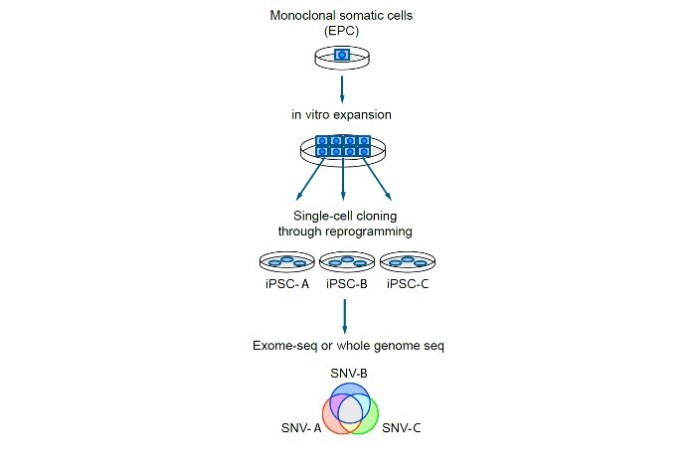Therapeutic stem cells can be made without introducing genetic changes that could later lead to cancer, a study in PLOS Genetics has found.
The discovery, made by researchers at the Wellcome Trust Sanger Institute, is a boost for scientists working on ways to make regenerative medicines from induced pluripotent stem (iPS) cells; a type of stem cell made by reprogramming healthy body cells.
It is the first time scientists have tracked the genetic mutations gathered by iPS cells as they are grown in the laboratory.
The idea behind the research was to follow the whole journey iPS cells will take when used in clinical therapy. The Sanger Institute team, led by Professor Allan Bradley and Dr Kosuke Yusa, started with blood cells donated by a 57-year-old man.
As a person grows from embryo, to child, to adult, and as they age, the cells in their body generate a mosaic of tiny genetic changes. Most of these mutations have no effect but some can lead to cancer. The Sanger Institute team traced the history of genetic changes in both the donated blood cell and the iPS cells created from it.
The results reveal that mutations arise 10 times less often in iPS cells than they do in lab-grown blood cells and that none of the iPS cell mutations are in genes known to cause cancer.
Lead researcher Dr Foad Rouhani said: “None of the mutations we found in induced pluripotent stem cells were cancer-driver mutations or mutations in cancer-causing genes. We didn’t find anything that would preclude the use of iPS cells in therapeutic medicine.”
In addition, the team used the iPS cells, reprogrammed from the donated blood cell, to trace the history of every mutation that one cell had developed from the time it was a fertilised egg all the way up to the moment it was taken out of the body.
This is the first time that mutation rates of both types of cells, the donor cell and iPS cell, have been calculated and compared.
Professor Allan Bradley said: “Until now the question of whether generating iPS cells and growing them in cell culture creates mutations has not been addressed in detail. If human cells are really to be reprogrammed on a large scale for use in regenerative medicine then understanding the mutations the donor cells carry will be a crucial step. We now have the tools to do this.”
The ability to track the genetic changes in cells over a lifetime could also improve scientists’ understanding of how, when and why mutations can lead to cancer.
Dr Kosuke Yusa said: “One of the exciting things is that we have found a way to use iPS cells as a tool to look at the genetic history of a single cell. It also underlines the fact that before you use these cells you really need to characterise them to a high degree to know where the mutations that have been introduced are.”
The team also found that the genetic changes that do take place in iPS cells in the lab might be caused by a mechanism known as oxidative stress. They hope this knowledge will help to find ways to improve the process of making iPS cells.
Researchers from the University of Cambridge and the European Bioinformatics Institute also contributed to the study.
Source: www.sanger.ac.uk




































